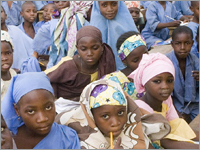UNGEI is pleased to collaborate with Beyond School Books to launch the podcast series, Changing the World for Girls. This series highlights the lasting impact education has on girls, families, communities and nations around the world.
By Rudina Vojvoda

©UNICEF/NYHQ2007-0496/Nesbitt
Girls and boys attend school in Nigeria. Dr. Judith-Ann Walker explained that schools in West Africa are often unwilling to accommodate married girls. As they become uneducated mothers, cycles of poverty are perpetuated.
NEW YORK, United States of America, 7 November 2013 – Girls’ education is an indispensable tool for female empowerment and directly leads to other development goals such as poverty reduction, better reproductive and family health, lower fertility rates, lower child mortality rates and reduction in the rate of infection and spread of HIV/AIDS.
AUDIO: Listen now
Yet, more than half of the world’s out-of-school children are girls, and gender disparities in education continue to persist in many countries.
In this episode of Changing the World for Girls, we talked to Dr. Adefunke Ekine, a lecturer at Tai Solarin University of Education in Nigeria, and Dr. Judith-Ann Walker, Co-Founder and Executive Director of the development Research and Projects Centre (dRPC). Both are scholars at the Echidna Global Scholars Program at Brookings Institution, where they are pursuing research on improving learning opportunities and outcomes for girls in the developing world.
speakers
© Brookings Institution/2013
From left to right: Dr Judith-Ann Walker and Dr Adefunke Ekine
Education to stop child marriage and fight poverty
Recent UNICEF data show that 1 in 3 young women aged 20–24 was married before the age of 18. Early marriage forces girls to leave school and miss out opportunities to receive an education and skills needed to fulfil their potential.
Dr. Walker, who is studying the effectiveness of keeping girls in school as a strategy for reducing high rates of early marriage in West Africa, explained that, often, schools are not receptive to accommodating married girls. Left out of school, these girls turn into uneducated mothers, perpetuating the cycle of poverty.
“I am a firm believer in non-formal education, and, in fact, the problem is poverty,” she said. “How to use education to transform that problem is where we have to give more skills and have the education tooled to suit the environment and to respond to poverty challenges of that environment.” She shared the example of a project in northern Nigeria that is not only providing job opportunities for women, but is also offering them basic education.
Abandoning harmful stereotypes, embracing mentorship
Dr. Ekine, who is researching gender-sensitive methods of teaching to promote science education for girls, pointed to negative stereotypes within the education system as a barrier to girls’ education.
“One of the ways we are looking to promote the girls’ retention inside the classes is actually to take away the stereotype in the classroom,” she said. “We want the teachers to understand that girls develop differently from boys, even though their brain capacity is the same.”
Dr. Ekine called for more female teachers in science, technology, engineering and mathematics (STEM) education, pointing out the crucial role that mentoring and role models can play in encouraging girls to pursue their education.
The research is there and the evidence is out. It is time to change the world for girls so that they receive the education that they are entitled to – and deserve.

